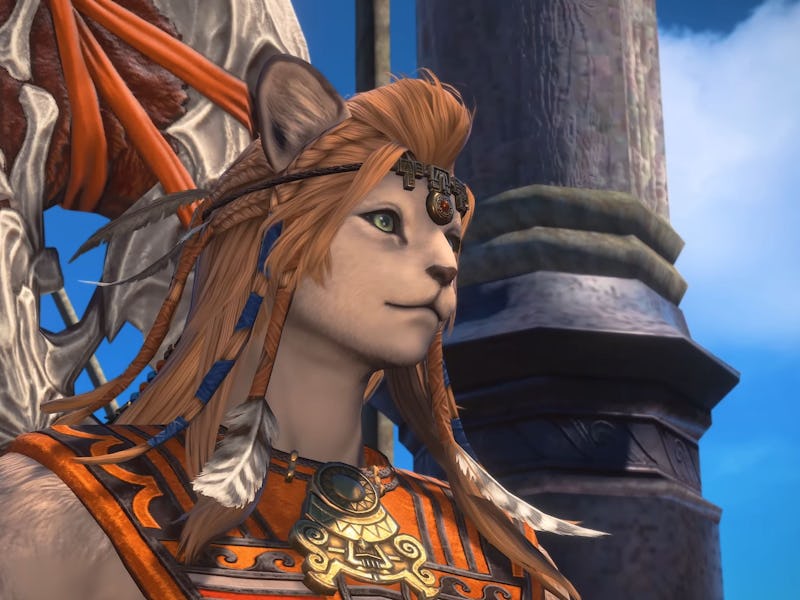Final Fantasy 14 Director’s Response to Transphobia Is a Model for Other Devs to Follow
Yoshi-P is standing up for FFXIV’s most unfairly treated Hrothgar.

Like so many other games recently, Final Fantasy XIV came under fire from the worst people on the planet earlier this year for not catering to their bigoted views. But instead of caving to their demands, developer Square Enix is instead standing by the actor who’s been targeted and doubling down on her character’s inclusion in the game.
In a new interview with Checkpoint Gaming, director Naoki Yoshida was asked how he felt about the reception to Final Fantasy XIV’s latest expansion, Dawntrail. In addition to addressing general feedback about the game, he also called out the transphobic abuse received by Sena Bryer, the transgender voice actor who portrays Wuk Lamat, a major character in the expansion.
Dawntrail has been a controversial expansion for FFXIV, and not all of it is in good faith.
“There were comments about how we are too accepting of diversity — some people seem to be disapproving of that,” Yoshida said. “I’m afraid one of our staff members received very negative comments and it almost felt like a personal attack, which breaks my heart, because she worked really hard and these criticisms were not constructive at all.”
Notably, Final Fantasy XIV has never dealt with this kind of backlash before, which makes both the abuse suffered by Bryer and Yoshida’s comments even more remarkable. Yoshida doesn’t go into detail about the comments Bryer received, but she’s been open about the hate that’s been directed toward her this year on social media. According to Bryer, she’s received threats against herself and her family, along with frequent misgendering and transphobic abuse.
Some developers might shy away a character that’s been met with such intense hatred from some of their players, but that doesn’t seem to be the case for Square Enix. Yoshida told Checkpoint Gaming that in the upcoming Patch 7.1 and beyond, “we’re hoping that we can show more of what makes Wuk Lamat so great, and I’m hoping that we can regain from there.”
Wuk Lamat’s voice actor has been targeted for transphobic abuse online since she revealed she was playing the role.
Seeing Yoshida defend Bryer is heartening, but some of his comments do highlight the difficulty that developers have in dealing with the kind of harassment she’s received.
“Wuk Lamat is a very complex character, and she even has a bit of a complex about herself,” he said. “Unfortunately, we didn’t delve very far into the background of why she had those feelings, so it appeared as if she left a negative impression. We accept that feedback. I feel a little sorry that we weren’t able to properly depict her.”
Undoubtedly, some criticism of Wuk Lamat is made in good faith, just like any other criticism of Final Fantasy XIV. But when that character is primarily being targeted because her voice actor is trans, it can be nearly impossible to tell which seemingly real criticisms are genuine and which are just covering for transphobia. As Bryer has pointed out, she still receives transphobic abuse on social media posts that have nothing to do with either Wuk Lamat or her gender identity, and there’s a clear pattern of other trans voice actors receiving similar harassment.
Naoki Yoshida says Wuk Lamat will have a continuing role in Final Fantasy XIV.
Especially for developers who aren’t trans themselves, it can be difficult to understand the shape that transphobia often takes online. Just about any trans person with any sort of visibility online has probably seen some shade of what Bryer is talking about, as transphobic comments pile up on innocuous posts and you always seem to get more negative comments and criticism — however polite it may appear — than your cisgender peers.
None of that means that Yoshida is taking the wrong approach here. As Final Fantasy XIV’s director, it’s natural that he wants to get to the core of complaints the game has received and correct the underlying issues. So while he may be giving too much credit to Wuk Lamat’s critics in assuming that they actually mean what they say, there’s nothing he or anyone can do to fix their hearts, or to force them out of the cowardice at the center of their bigotry to say what they really mean. Given the circumstances, Square Enix may be doing the best thing it can do to address the criticisms of Wuk Lamat — making it clear that transphobia is the problem, not the trans woman it’s targeting.